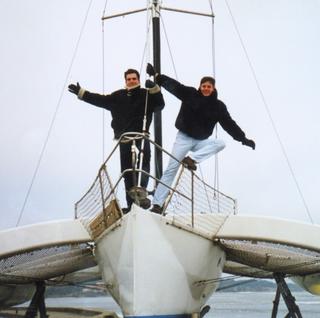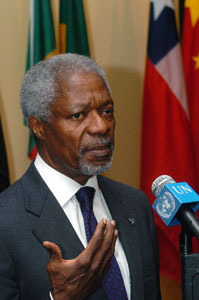European Union supporters in Latvia and Estonia expressed concern Thursday about a new survey pegging their countries as the most EU-skeptical in Europe
Published:
4 August 2003 y., Monday
European Union supporters in Latvia and Estonia expressed concern Thursday about a new survey pegging their countries as the most EU-skeptical in Europe—findings that come just two months before both Baltic states hold referendums on membership. A mere 32 percent of Estonians and 37 percent of Latvians agreed entry would be "a good thing," making them the most pessimistic of those questioned in the EU study released Wednesday. By contrast, 72 percent of Cypriots and 61 percent of Poles said joining would be good for them.
Latvia and Estonia will be the last of 10 EU candidate countries to put the issue of entry to a vote—and observers say there's now a chance that one or both nations could become the first to reject membership in Europe's most powerful multilateral club.
"People are afraid, they don't know what to believe and they're confused," said Pille-Mai Helemae, spokeswoman for the high-profile "Yes to the EU" group in Estonia. "It's going to be a hard fight. But in the end, I'm sure enough people will see more pros than cons to membership." Confusion about the EU was illustrated in the biannual Eurobarometer _ which questioned 1,000 people in each candidate nation in May—with 62 percent of Latvian and 71 percent of Estonian respondents saying they were either poorly informed about the accession process or not informed at all.
The Czech Republic, Hungary, Lithuania, Poland, Slovakia, Slovenia and Malta have already approved EU referendums, most by wide margins. Cyprus is leaving it's decision to lawmakers. If Estonia and Latvia pass their plebiscites on Sept. 14 and Sept. 20 respectively, they would join the EU together with the other candidates in 2004.
Virtually all top leaders in Estonia and Latvia have been pro-EU since the Baltic Sea nations regained independence—arguing that entry will raise their nations international stature, forge vital European trade links and boost living standards.
But official enthusiasm has never been matched outside the halls of power, with many Estonians and Latvians fearing a loss of sovereignty to the EU. Anti-EU groups compare what they say is an overly centralized EU with the U.S.S.R.; one of their symbols is an EU flag stamped with a Communist hammer and sickle.
If the results of the latest survey spooked EU supporters, they delighted opponents. "If you're a EU supporter, I believe the picture is even blacker," said Uno Silberg, who heads Estonia's "No to the EU Movement." "We're confident the referendum will fail."
Šaltinis:
balticsww.com
Copying, publishing, announcing any information from the News.lt portal without written permission of News.lt editorial office is prohibited.
The most popular articles
 Blue Card scheme to attract highly qualified migrants to the EU came closer on Tuesday 4 November.
more »
Blue Card scheme to attract highly qualified migrants to the EU came closer on Tuesday 4 November.
more »
 Young people from nine countries learn to sail and work together thanks to EU youth programme.
more »
Young people from nine countries learn to sail and work together thanks to EU youth programme.
more »
 Domestic violence is one of the most widespread violations of women's human rights across the world.
more »
Domestic violence is one of the most widespread violations of women's human rights across the world.
more »
 The European Parliament awards the Sakharov Prize every year to people who have dedicated their lives to defending human rights and mutual understanding.
more »
The European Parliament awards the Sakharov Prize every year to people who have dedicated their lives to defending human rights and mutual understanding.
more »
 The other week 200 young journalists from all over Europe descended on the European Parliament for workshops and debates.
more »
The other week 200 young journalists from all over Europe descended on the European Parliament for workshops and debates.
more »
 Risk assessment seen as key to safety at work. It was an accident waiting to happen.
more »
Risk assessment seen as key to safety at work. It was an accident waiting to happen.
more »
 The European Parliament's Sakharov Prize for Freedom of Thought has been awarded this year to Chinese political activist Hu Jia, EP President Hans-Gert Pöttering announced in Strasbourg today.
more »
The European Parliament's Sakharov Prize for Freedom of Thought has been awarded this year to Chinese political activist Hu Jia, EP President Hans-Gert Pöttering announced in Strasbourg today.
more »
 Microsoft Corp., internationally acclaimed actress Angelina Jolie, and more than 25 law firms and corporate law departments announced the formation of Kids in Need of Defense (KIND).
more »
Microsoft Corp., internationally acclaimed actress Angelina Jolie, and more than 25 law firms and corporate law departments announced the formation of Kids in Need of Defense (KIND).
more »
 The European Commission today welcomed the decision by the European Parliament to approve the proposal for a directive on Temporary Agency Work.
more »
The European Commission today welcomed the decision by the European Parliament to approve the proposal for a directive on Temporary Agency Work.
more »
 Hungary emerged among the three most miserable nations on a European happiness-sadness scale.
more »
Hungary emerged among the three most miserable nations on a European happiness-sadness scale.
more »